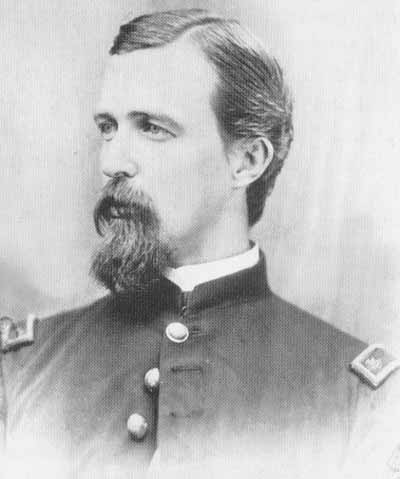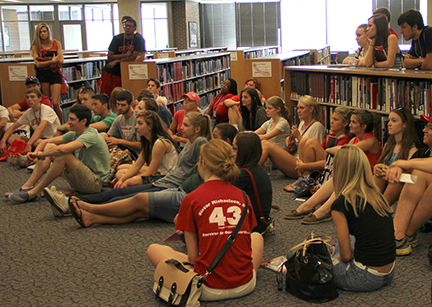 Currently featured in the Stanley J. Lucas, MD Board Room is a display about Dr. John Shaw Billings, MD, which was completed in conjunction with the Henry R. Winkler Center’s 5th annual Cecil Striker Society lecture. Dr. Dale C. Smith was the guest speaker for the event and his lecture was entitled “John Shaw Billings and the Medical College of Ohio: Shaping Twentieth Century Medicine.”Dr. Billings was an 1860 graduate of the Medical College of Ohio, a precursor to the University of Cincinnati College of Medicine.
Currently featured in the Stanley J. Lucas, MD Board Room is a display about Dr. John Shaw Billings, MD, which was completed in conjunction with the Henry R. Winkler Center’s 5th annual Cecil Striker Society lecture. Dr. Dale C. Smith was the guest speaker for the event and his lecture was entitled “John Shaw Billings and the Medical College of Ohio: Shaping Twentieth Century Medicine.”Dr. Billings was an 1860 graduate of the Medical College of Ohio, a precursor to the University of Cincinnati College of Medicine.
Featured Resource: Embase
 Brought to you by UC Libraries, Embase is a key resource for biomedical evidence from published, peer-reviewed literature, in-press publications and conference abstracts. Embase is known as an authoritative resource for generating systematic reviews and for drug, disease, and medical device data. Comprehensive indexing maximizes the searchability of this database. Continue reading
Brought to you by UC Libraries, Embase is a key resource for biomedical evidence from published, peer-reviewed literature, in-press publications and conference abstracts. Embase is known as an authoritative resource for generating systematic reviews and for drug, disease, and medical device data. Comprehensive indexing maximizes the searchability of this database. Continue reading
Maintenance Will Impact Libraries Web News, Hours and Directory
UC Libraries will be performing routine maintenance Sunday, June 29, from 7:00 am to 12:00 pm.
The following services will be offline during maintenance:
- Off Campus Access (proxy services)
- Ilib.libraries.uc.edu (intranet)
- Libapps server:
- Library Blogs
- UC Libraries staff directory on website
- A-Z Database List on website
In addition to these services being unavailable, users may see an error on the website in the News, Hours and Staff Directory areas while this maintenance is being performed. All other areas of the UC Libraries website and Library Catalog will be unaffected.
Join UC Libraries June 30 for a Presentation on Digital Humanities in China

Xiaoguang Wang
Digital Humanities is a new academic term for most Chinese scholars, though computer and information technologies have been used widely in many research projects by scientists and humanities in China for several decades, from computational linguistics to historical GIS and digital art. In this presentation, to be held Monday, June 30 from 2-3:30 p.m. in Langsam Library 480, Professor Xiaoguang Wang will provide a brief introduction to the emerging field of digital humanities in China. He will showcase some well-known digital humanities research projects in China and a survey of key academic grants for humanities and social sciences. The Digital Humanities Center in Wuhan University and some ongoing projects will be introduced and presented.
UC Libraries Welcomes New Bearcats

Orientation participants learn about how to print while in the library
This summer, Langsam Library is a busy place as over 4,000 incoming students participating in UC’s New Student Orientation visit and learn about the Libraries. While here, they engage in activities designed to be both entertaining and informative about the various research resources, assistance and library services they can utilize when they begin classes in the fall.
Data Management Planning Workshops – Starting June 30th
Join the University of Cincinnati Libraries for a series of workshops on data management planning! The workshops will address universal data management best practices for health science, science and engineering students and professionals. While much of the focus is on STEM fields, this course will be useful for anyone interested in learning more about data management practices and principles. Each workshop will include a teaching portion and hands on activities. We recommend that registrants attend all five workshops if possible. Workshops will be held in the Health Science Library (HSL) Electronic Classroom G005G.
Register at http://webcentral.uc.edu/hslclass/home.aspx
UCBA Fun Facts: Favorite biography?
Question: What’s your favorite biography?
 Heather Maloney, Library Director: The Stranger Wilde: Interpreting Oscar
Heather Maloney, Library Director: The Stranger Wilde: Interpreting Oscar
 Michelle McKinney, Reference/Web Services Librarian: Finding Fish by Antwone Fisher (technically an autobiography).
Michelle McKinney, Reference/Web Services Librarian: Finding Fish by Antwone Fisher (technically an autobiography).
 Kellie Tilton, Instructional Technologies Librarian: Um. I’m not sure the last time I read a straight biography. Memoirs and autobiographies are another story….
Kellie Tilton, Instructional Technologies Librarian: Um. I’m not sure the last time I read a straight biography. Memoirs and autobiographies are another story….
 Lauren Wahman, Instruction Librarian: Can’t remember the last time I read a biography…
Lauren Wahman, Instruction Librarian: Can’t remember the last time I read a biography…
 Rachel Lewis, Technical Services Manager: I’m going to piggy back off of Chris. I did enjoy Tuesdays with Morrie by Mitch Albom.
Rachel Lewis, Technical Services Manager: I’m going to piggy back off of Chris. I did enjoy Tuesdays with Morrie by Mitch Albom.
 Tammy Manger, Public Services Manager: I really enjoyed reading about the life of Laura Ingalls Wilder. I was a fan of Little House on the Prairie.
Tammy Manger, Public Services Manager: I really enjoyed reading about the life of Laura Ingalls Wilder. I was a fan of Little House on the Prairie.
 Chris Marshall, Public Services Assistant: Tuesdays with Morrie by Mitch Albom
Chris Marshall, Public Services Assistant: Tuesdays with Morrie by Mitch Albom
Something New from the DAAP Library
![VJ11[1]](https://libapps.libraries.uc.edu/liblog/wp-content/uploads/2014/06/VJ111-270x190.jpg)
![VJ8[1]](https://libapps.libraries.uc.edu/liblog/wp-content/uploads/2014/06/VJ81-190x190.jpg)
Python Workshop at the Health Sciences Library – June 19th
 The HSL will offer an Introduction to Python workshop on Thursday, June 19th from 2:00 – 4:00pm in the HSL Electronic Classroom (G005G).
The HSL will offer an Introduction to Python workshop on Thursday, June 19th from 2:00 – 4:00pm in the HSL Electronic Classroom (G005G).
Come and learn this widely used, general purpose, high-level programming language. Python is often used as a scripting language for applications such as data processing, parsing and web services. This workshop will cover the basics of Python, including variables and data types, arrays, dictionaries, operators, conditions, loops, and functions. The focus will be on the hands-on exercises to help provide a better understanding of Python to the attendees.
No programming experience is necessary. Beginners are encouraged to attend.
Registration is required for this workshop. To register, go to http://webcentral.uc.edu/hslclass/ and locate this workshop.
The Great War Exhibit in Langsam Library
 July 28th marks the 100th anniversary of the start of World War I. In commemoration, UC Libraries has created an exhibit on display on the 4th floor of the Walter C. Langsam Library. “The Great War: Poems, Movies, Music and Literature Inspired by World War I” showcases the collections of UC Libraries.
July 28th marks the 100th anniversary of the start of World War I. In commemoration, UC Libraries has created an exhibit on display on the 4th floor of the Walter C. Langsam Library. “The Great War: Poems, Movies, Music and Literature Inspired by World War I” showcases the collections of UC Libraries.
Included in the display are references to both popular and classical music to come out of the war such as “Over There,” “It’s a Long Way to Tipperary,” and Benjamin Britten’s “War Requiem.”
